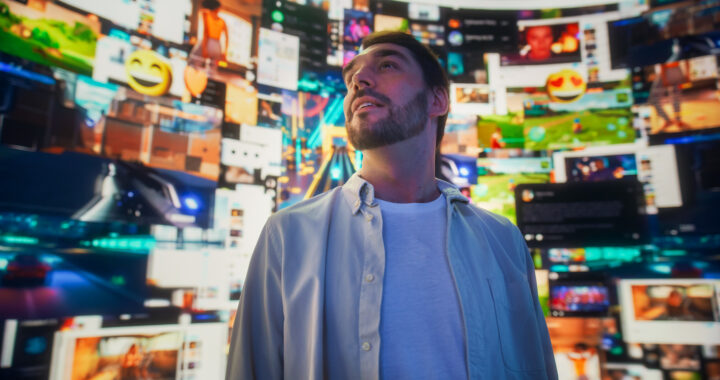For all the smart gadgets, voice assistants, AI bots and algorithmic wizardry out there, some things still remain stubbornly human.

No matter how fast tech evolves, there are parts of life it just can’t replicate because they’re messy, emotional, unpredictable, or deeply rooted in something beyond code. Whether it’s the warmth of a glance or the chaos of creativity, tech can’t touch these things and probably never will. While the idea of losing our humanity is pretty scary, this should give us all hope.
1. Genuine human connection

You can text, voice note, or video call all day, but nothing hits quite like sitting next to someone and just being there. The energy in a shared silence, the subtle change in someone’s posture, the unspoken reassurance of a hand on your shoulder… none of that gets captured in pixels. Technology lets us communicate faster, but connection isn’t just about speed—it’s about presence. You can’t automate true empathy, no matter how many heart emojis you throw into the chat.
2. The randomness of spontaneous laughter

Tech can mimic a joke, suggest memes, or feed you viral videos, but it doesn’t know the weird timing of a joke that lands because of a shared in-joke, a weird look, or a moment of mutual absurdity that no algorithm could ever engineer. Real laughter is rooted in surprise, context, and chemistry. You can’t manufacture that with code—it lives in the unpredictable magic of human moments.
3. Gut instincts

Apps can recommend, calculate, and suggest based on data. But instinct isn’t about logic—it’s a mix of emotion, experience, subconscious cues, and something you can’t quite explain. It’s that subtle inner nudge that says, “Something’s off,” or, “This feels right.” Technology can help you compare options, but it can’t make that subtle, intuitive call that comes from a deep, personal place. Some decisions are felt, not computed.
4. The value of imperfection

AI writes with precision. Apps streamline. Filters perfect every image. But humans? We mess things up, and weirdly, that’s where the good stuff lives. An off-key song with heart behind it. A scribbled birthday card that makes you cry. A clumsy but meaningful apology. Perfection might look nice, but it often feels cold. It’s the flaws and wobbliness that make things real, and that’s something tech will never truly grasp.
5. Soulful creativity

Yes, AI can generate art. But soul? That can’t be generated. True creativity taps into emotion, memory, conflict, and dreams. It’s layered with lived experience, cultural nuance, and a deep need to express something real. Tech can imitate style or structure, but it doesn’t bleed onto the canvas or into the lyrics. It doesn’t cry while it writes or laugh at its own lines. Human creativity still holds the edge, because it means something.
6. The nuance of emotional support

You can build a chatbot to respond kindly. You can even teach it to mimic compassion. However, when someone’s having a hard day, no algorithm understands the right kind of silence, the perfect timing of “I’ve got you,” or the instinct to just sit and listen. True support isn’t scripted. It adapts in real time, senses changes in tone, and picks up on things left unsaid. No machine can feel that out the way a human can.
7. Shared nostalgia

Algorithms can remind you what you posted three years ago. Of course, that’s not the same as cracking up with an old friend about something ridiculous that happened on a holiday you still reference in code words. Nostalgia isn’t just memory—it’s emotion, context, and shared meaning. Tech can surface the content, but not the feeling. Not the warmth of “remember when” that hits in your chest and makes time feel beautifully warped.
8. The way love actually feels

Dating apps can match you. AI can write your opening line. However, that butterflies-in-your-stomach feeling? The way someone’s presence can change your entire mood? The way your heart jumps when you hear their voice? That’s not programmable. Love isn’t just logistics or compatibility scores. It’s electric, vulnerable, irrational, and wild. No tech can replicate the way it hits you when you least expect it, and refuses to let go.
9. Moral judgement

Tech can process ethics in theory, but the real world is messy. What’s fair? What’s kind? What’s necessary? These aren’t always black and white, and they change based on context, culture, and intention. Humans have the ability to weigh emotion, empathy, and consequences together in ways tech just can’t. Judgement, in real life, is deeply human, and often requires more heart than logic.
10. Spirituality and wonder

You can programme a voice assistant to answer deep questions, but it won’t feel awe. It won’t look up at the stars and feel small in a good way. It won’t sit in silence and feel connected to something bigger than itself. Wonder, faith, the mystery of why we’re here—those aren’t things you can Google your way through. They’re part of the human condition, and no software update’s going to change that.
11. The healing power of touch

No haptic feedback or vibrating app will ever replace the grounding comfort of someone holding your hand. Whether it’s a hug in the middle of grief or the reassuring weight of someone leaning on you, physical presence holds a kind of medicine tech can’t deliver. There’s chemistry involved—literally. Touch releases hormones, calms the nervous system, and connects us in ways screens never will. You can’t download that.
12. Real trust

You can trust a password manager. You can trust a calendar reminder. But trusting a person? That’s built over time, shaped by honesty, vulnerability, and a thousand little moments of showing up. Tech can assist, but it can’t look you in the eye and mean it. It can’t take responsibility, hold you accountable, or walk beside you through chaos. Real trust is human, and always will be.




